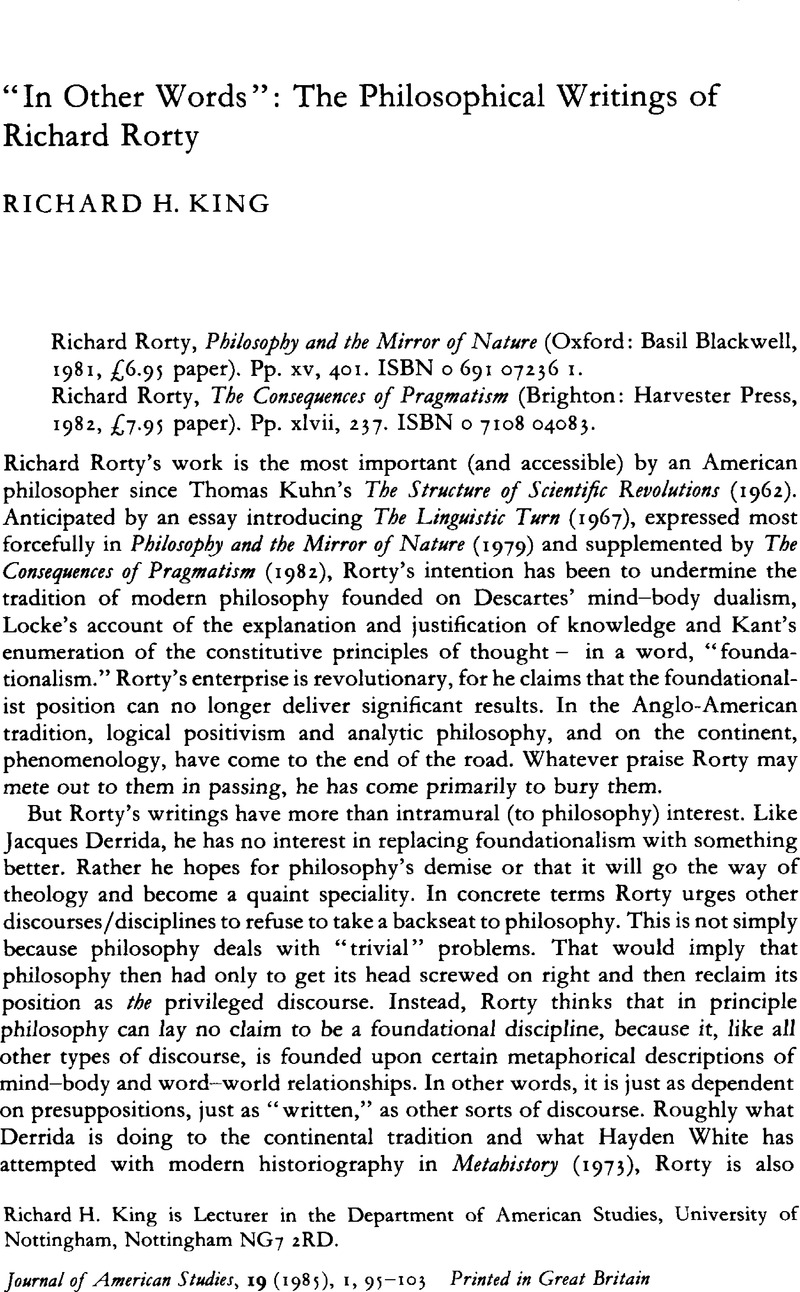Published online by Cambridge University Press: 16 January 2009

1 Norris, Christopher' The Deconstructive Turn (London: Methuen, 1983)Google Scholar is an interesting effort at deconstructing certain philosophical texts via an analysis of their rhetorical strategies. Besides Derrida, Norris draws quite liberally upon Rorty.
2 Rorty, Richard, “Introduction,” The Linguistic Turn (Chicago: University of Chicago Press, 1967), p. 38Google Scholar.
3 Ibid. p. 39.
4 Bernstein, Richard, “Philosophy in the Conversation of Mankind,” Review of Metaphysics, 33 (1979–1980), 745–75Google Scholar. The reviews and responses to Rorty's work have been many and of high quality. Bernstein's analysis is sympathetic though not uncritical as is his new Beyond Objectivism and Relativism (Oxford: Basil Blackwell, 1983)Google Scholar which attempts with considerable skill to bring together Rorty, Jürgen Habermas, Hans-Georg Gadamer and Hannah Arendt.
5 This view of natural rights as “summaries” comes in a recent article by Rorty, , “Postmodernist Bourgeois Liberalism,” Journal of Philosophy 80 (10 1983), 583–89CrossRefGoogle Scholar. It is one sign that Rorty is beginning to develop the political-theoretical implications of his position.
6 Rorty, , “Cavell on Skepticism,” Consequences of Pragmatism, pp. 176–90Google Scholar.
7 Ibid. p. 62.
8 Rorty, Discussion with Taylor, Charles and Dreyfus, Hubert in Review of Metaphysics, 34, (09 1980), 3–55Google Scholar.
9 My characterization of the nature of the “ conversation ” draws upon Hannah Arendt's discussion of political dialogue which she likens to aesthetic discourse as analysed by Kant.
10 There is another, less extreme suggestion from Rorty concerning philosophy's future. According to this position there can be no anti-foundationalism without the continuing vitality of foundationalism: “No constructors, no deconstructors.” Thus on this view, philosophy departments should not liquidate themselves but continue on with the technical problems that they have been dealing with. But they should no longer expect to be considered as anything more than an academic specialty.
11 Bernstein, pp. 768–69.
12 West, Cornel, Review of Philosophy and the Mirror of Nature, Union Seminary Quarterly Review, 37 (Fall/Winter 1981–1982), 179–85Google Scholar. See also Connolly, William, “Mirror of America,” Raritan Review, 3 (Summer 1983), 124–35Google Scholar.
13 Rorty, , Philosophy and the Mirror of Nature, p. 279Google Scholar.
14 For Rorty on Derrida, see “Philosophy as a Kind of Writing,” Consequences of Pragmatism, pp. 90–109Google Scholar, and “Signposts Along the Way that Reason Went,” London Review of Books, 6 (16 02–29 02 1984), 5–6Google Scholar. Rorty is one of the few people who can take Derrida seriously without following him blindly or falling into a kind of sub-Derridean rhetoric.
15 See, for instance, Gass, William, “Carrots, Noses, Snow, Roses,” World Within the Word (New York: Knopf, 1978), pp. 280–307Google Scholar.
16 Rorty, , “Is There a Problem about Fictional Discourse?” Consequences of Pragmatism, pp. 110–38Google Scholar.
17 Ibid. p. 158.
18 This is the position – indeed the theme – of Bernstein's Beyond Objectivism and Relativism.
19 Rorty, , “Method, Social Science, Social Hope,” Consequences of Pragmatism, p. 201Google Scholar.
20 Rorty, Discussion with Taylor, and Dreyfus, , Review of Metaphysics, pp. 46–55Google Scholar.
21 MacIntyre, Alasdair, After Virtue (Notre Dame, Indiana: University of Notre Dame Press, 1981)Google Scholar. In his response to Rorty's essay on “Postmodern Bourgeois Liberalism”, MacIntyre questions Rorty's appeal to the community of enquirers or actors as a way to arrive at warranted assertability since such communities on MacIntyre's view simply do not exist in coherent enough form to ground judgements.
22 Kundera, Milan, “The Novel and Europe,” New York Review, 31 (19 07 1984), pp. 15–19Google Scholar.